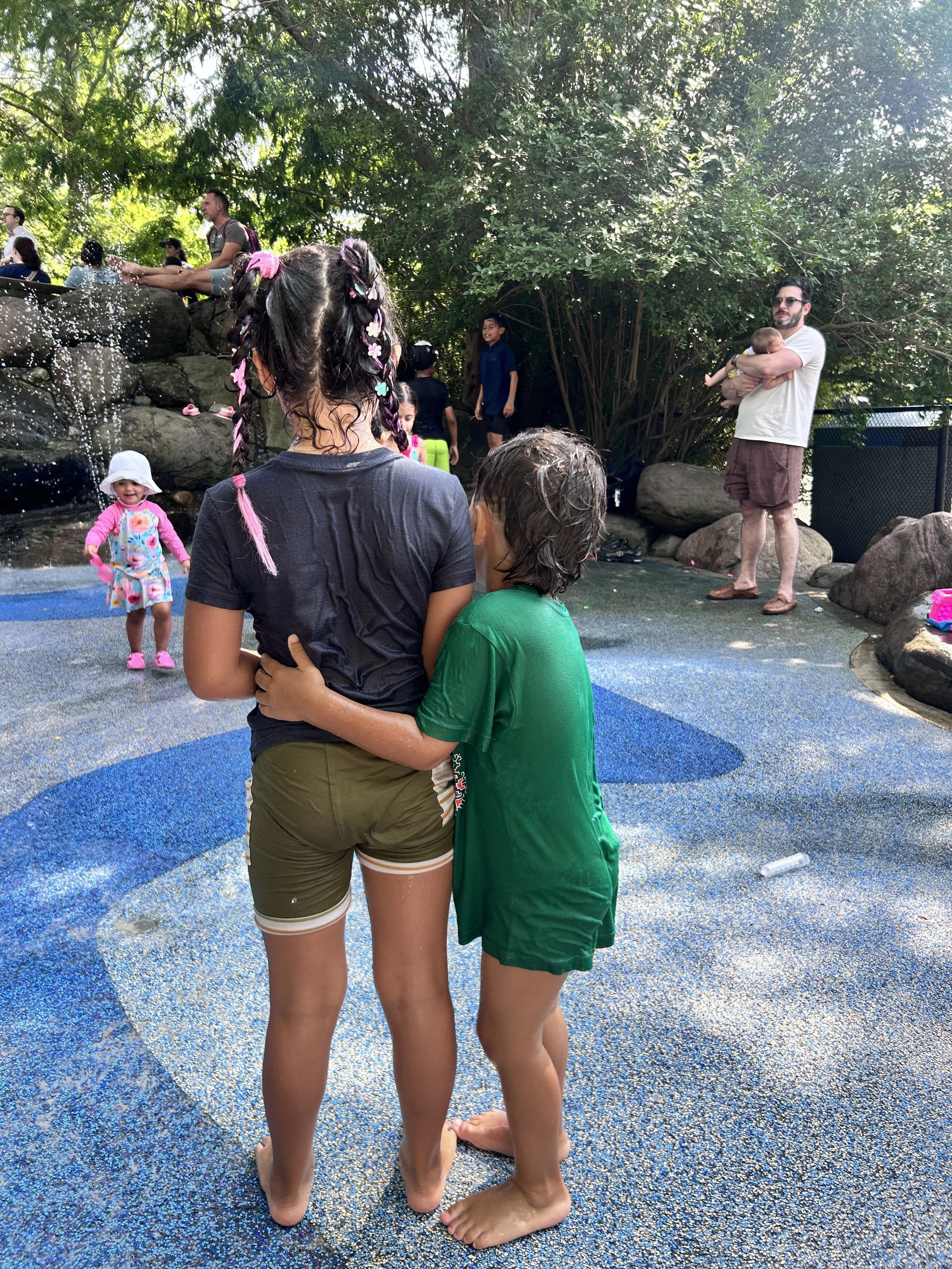Play, a Child’s Work
“Play is the work of the child.”
Play Matters
Play is not an add-on to early childhood; it is the engine of development. Children need generous, daily blocks of uninterrupted play: protected time to choose, repeat, and go deep, so that learning can unfold at its natural pace. Through play, children build language, shape social understanding, and exercise the executive function that organizes thought and behavior. Symbolic and socio-dramatic play fuel vocabulary, expressive language, and the pragmatics of conversation (agreeing on roles, sustaining a storyline, resolving conflict). Socially, children practice cooperation, negotiation, and perspective-taking. Across all forms of play (especially outdoors), children strengthen self-regulation, learn to manage emotions, take healthy risks, and think creatively. These experiences strengthen memory and lay the groundwork for later academic achievement, mental flexibility, emotional resilience, and a happy life.
Five types of child-led play
Physical play. Whole-body movement (climbing, running, jumping, etc.) and fine-motor activity (sewing, coloring, etc.) that develop coordination, strength, independence, and self-control.
Play with objects. A progression from sensorimotor exploration to sorting and classifying, then building and constructing, which grows fine-motor control, spatial awareness, and problem-solving.
Symbolic (pretend) play. Using symbols to stand in for ideas and objects, for example, a stick becomes a sword and an empty hand “feeds” a doll. This lays the foundation for language, art, imagination, and mathematical reasoning, while helping children make sense of their inner and outer worlds.
Pretense/socio-dramatic play. Shared imaginary scenarios with roles and agreed-upon rules where children practice turn-taking, negotiation, and conflict resolution as they co-create stories with peers.
Games with rules. From hide-and-seek to card and board games, children follow shared rules, take turns, share materials, and consider others’ perspectives.
How play builds language, social skills, and executive function
Language. Adult-modeled dialogue and peer collaboration during pretend scenarios grow vocabulary, syntax, and the social use of language (pragmatics).
Social development. Role-play and group games foster cooperation, compromise, friendship skills, and perspective-taking; parallel and collaborative physical play broaden these experiences.
Executive functioning. Physical and imaginative play strengthen attention, planning, flexibility, emotion regulation, and resilience.
Designing a classroom or home for purposeful play
Purposeful play requires unhurried time and accessible materials. Long, minimally interrupted blocks invite depth while a thoughtful layout invites choice. Some examples can include:
Outdoor physical play. Climbing structures, open space for running, balls, tricycles or bikes, and living “labs” like gardens or shaded groves build gross-motor skills, spatial awareness, and core strength that later support writing posture and stamina.
Fine-motor exploration. Outdoors: sandboxes with shovels, stones, and varied natural objects. Indoors: art invitations such as drawing, painting, cutting, and gluing with varied media to strengthen wrists and fingers and indirectly prepare for handwriting.
Object play zones. Blocks and sensory materials for stacking, sorting, and constructing to develop finger strength, spatial reasoning, and problem-solving.
Symbolic play spaces. A quiet rest or reading nook for solo play, a generous art area, dolls, and daily songs and storytelling to nurture symbolic expression and abstract thinking.
Socio-dramatic play areas.
Outdoors: a treehouse or an outdoor kitchen stocked with real pots, pans, and utensils for dirt and mud play.
Indoors: a dramatic-play corner with carefully chosen props (kitchen, dolls, dollhouse, etc.), simple costumes.
Games with rules. Board games and small or large group activities that exercise strategy, pattern recognition, attribute sorting, and turn-taking.
Closing Thoughts
Play stands as a cornerstone of early childhood education, fostering holistic development across language, social skills, and executive functioning. By strategically setting up classrooms to encourage purposeful play and leveraging its potential across subjects, educators can facilitate a space for children to explore, learn and grow. Through thoughtful guidance and support during play, teachers can nurture cognitive, social-emotional, and physical skills that children need for healthy development.
—
References:
Author Unknown. (1985). Mathematical concepts found in the sensorial materials. Beginnings, Winter, 37.
ETC Montessori. (2019, March 7). Developing a mathematical mind in Montessori early childhood. [Video]. YouTube. https://www.youtube.com/watch? v=k8kyXdSAEj
Q Hà, T. A. (2022). Pretend play and early language development — relationships and impacts: A comprehensive literature review. Journal of Education, 202(1), 122-130.
Lillard, P.P. (1972). Montessori: A modern approach. The classic introduction to Montessori for parents and teachers. Schocken Books.
Molu, F. (2023). Importance of play in early childhood education and children’s right to play. Journal Plus Education, 23, 50-64.
Oddo, J. et al. (2018). The importance of play in the development of language skills. Atlantic Speech School. https://www.theministryofparenting.com/wp-content/ uploads/2018/05/The-Importance-of-Play-in-the-Development-of-Language-Skills.pdf
Phajane, M. (2019). Play as a medium for learning: Overwhelming challenges for early childhood teachers. Gender & Behavior, 17(4), 13962-13969.
Woods, C. (2001). Handwriting doesn’t have to be a lost art. Montessori Life, 13 (4), 38-41.

